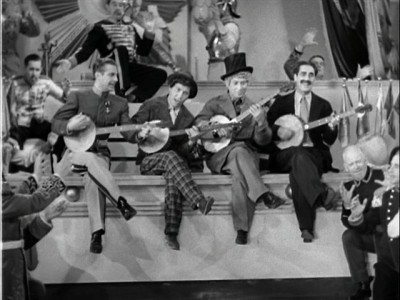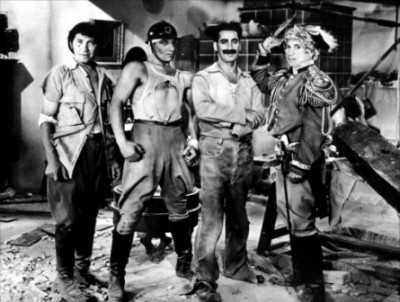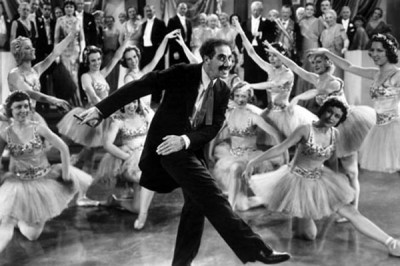
For the first — and only — time in their career, the Marx Brothers found themselves teamed up with a great director, instead of the usual journeyman or outright hacks who usually helmed their movies. That director was Leo McCarey — the man who had to, for all intents and purposes, turn Laurel and Hardy into a team, and who was carving out a niche for himself as one of the great comedy directors. (Before another year had passed, McCarey would have made films with Paramount’s other top comics: W.C. Fields and Mae West.) However, it took some considerable time before the collaboration between the Marx Brothers and McCarey — Duck Soup (1933) — would come to be fully appreciated for the masterpiece it is. Legend has always had it that the film was a flop — hence the Brothers’ departure from the studio and a year offscreen. That legend is — as legends tend to be — somewhat exaggerated. (Groucho had a hand in that legend with his tendency to overpraise MGM producer Irving Thalberg, who took them under his wing in 1935.) However, the movie was clearly more expensive (despite wholesale use of standing sets) than their previous outings, and that expense wasn’t really justified by the returns. Regardless, you would be hard-pressed today — and for the last 40 years — to find anyone who’d seriously suggest that Duck Soup isn’t their best picture.

In many ways, the film is part and parcel of a brief vogue of political satires — The Phantom President (1932), Million Dollar Legs (1932), The Dark Horse (1932), Diplomaniacs (1933) — and is easily the best remembered of them. (It may be a bit of a stretch calling it a satire, but there are certainly satirical elements to it.) The idea is that fabulously wealthy Mrs.Teasdale (Margaret Dumont) will only continue to pour money into the treasury of the country of Freedonia if they’ll make Rufus T. Firefly (Groucho) their leader. It’s never clear why she’s sold on him, except that this is a Marx Brothers picture and nothing ever seems to shake the woman’s faith in whatever character Groucho is playing. For himself, Firefly seems only marginally interested in the whole thing — showing up late for his inauguration, insulting everybody (including the oblivious Mrs. Teasdale) and even singing a song that should clue the crowd in on the fact that his inauguration is not the best of ideas (“If you think this country’s bad off now, just wait till I get through with it”). Instead, they happily cheer the man.

To complicate matters, we have Ambassador Trentino (Louis Calhern) of Sylvania who, with the aid of spies, plans to gain control of Freedonia. That his chief spies are Pinky (Harpo) and Chicolini (Chico) probably gives you a good idea of how well this will go. It doesn’t help matters that Firefly took an instant liking to Trentino at first glance. It’s all nonsensical and often downright surreal — with occasional doses of political commentary that reflect as badly on the people as the politicians. (The gospel-like inclusion of “They got guns, we got guns, all God’s children got guns. We’re gonna walk all over the battlefield ‘cause all God’s children got guns” in the song “The Country’s Going to War” is still pretty strong.) In a lot of respects, it can be said that Duck Soup is essentially a refinement of elements from earlier films — or plays. The whole buildup and payoff of Groucho’s introduction is appropriated from Animal Crackers (1930) (which in itself owes a lot to Gilbert and Sullivan’s The Mikado). But it’s all more than a refinement — it’s the perfection of those elements. And better than that, you won’t find.
The Asheville Film Society will screen Duck Soup Tuesday, Jan. 1 at 8 p.m. in the Cinema Lounge of The Carolina Asheville and will be hosted by Xpress movie critics Ken Hanke and Justin Souther.



Before you comment
The comments section is here to provide a platform for civil dialogue on the issues we face together as a local community. Xpress is committed to offering this platform for all voices, but when the tone of the discussion gets nasty or strays off topic, we believe many people choose not to participate. Xpress editors are determined to moderate comments to ensure a constructive interchange is maintained. All comments judged not to be in keeping with the spirit of civil discourse will be removed and repeat violators will be banned. See here for our terms of service. Thank you for being part of this effort to promote respectful discussion.